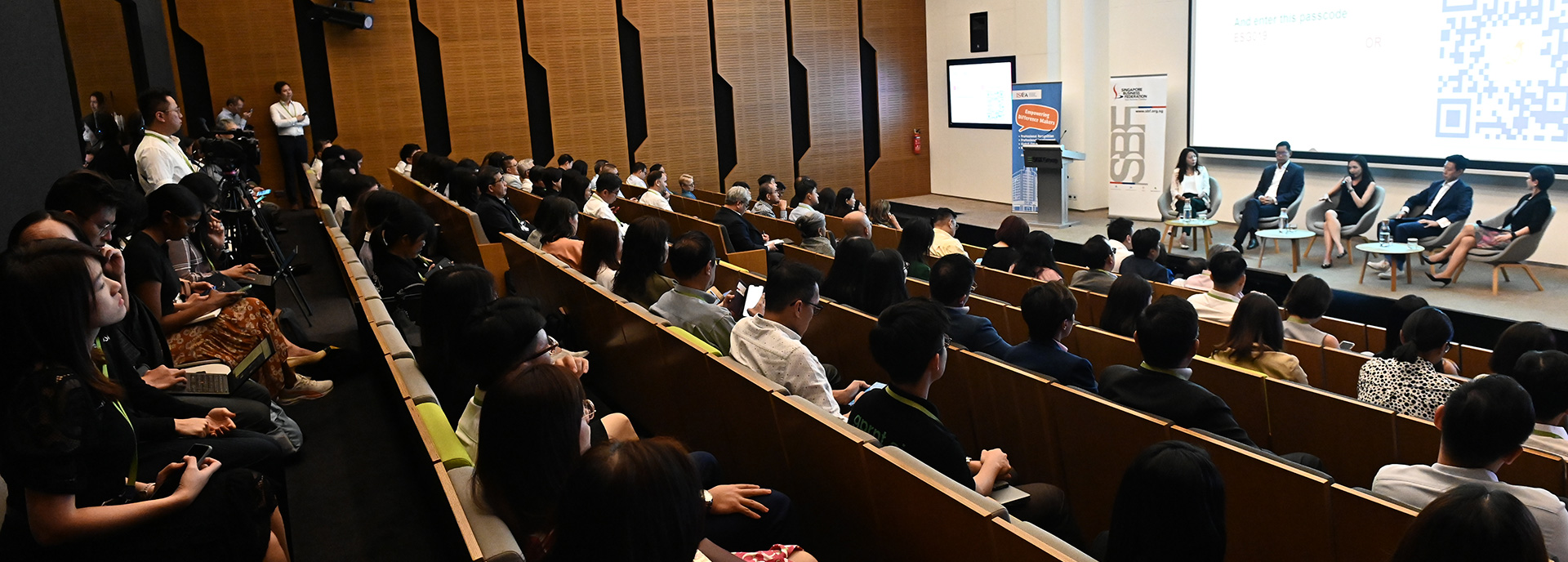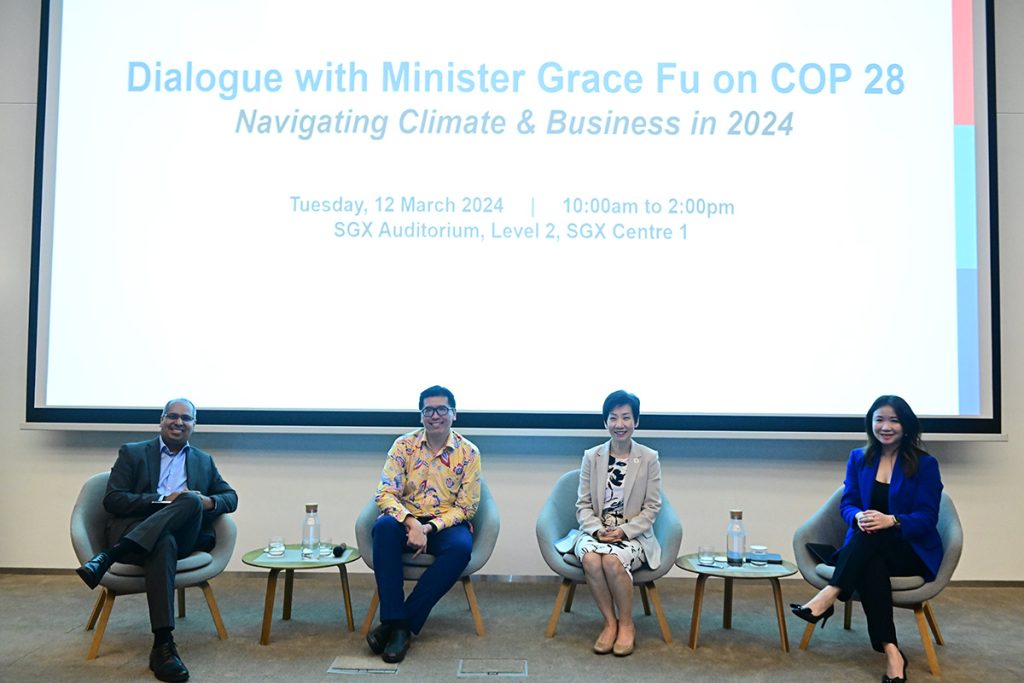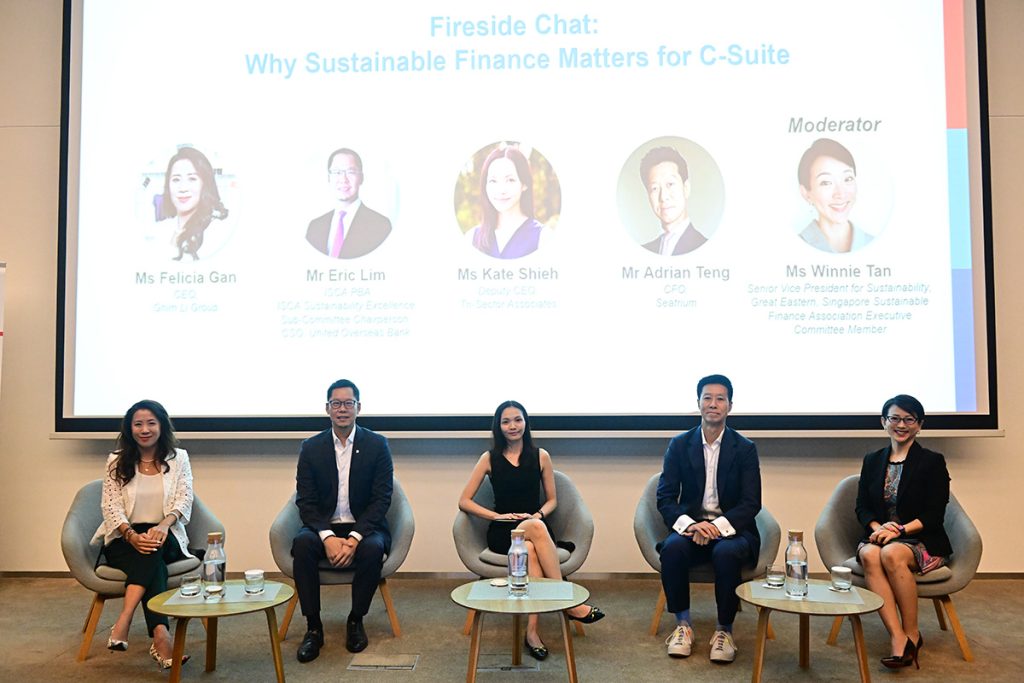
The COP28 UN Climate Change Conference in Dubai saw significant breakthroughs in many key areas ranging from agriculture to energy transition. Recognising the indisputable relevance of these developments, Singapore Business Federation (SBF) and ISCA came together to engage leading minds and business leaders on the takeaways from the conference, in a bid to galvanise the business and accountancy communities in Singapore to collective climate action.
On March 12, a dialogue session titled “Navigating Climate & Business In 2024” took place at the SGX Auditorium; it featured an on-site capacity crowd and virtual attendance of more than 1,000 SBF and ISCA members.
ISCA President Teo Ser Luck started off the event by positing that sustainability is now at the heart of board agendas. He suggested that with the support of the government and the participation of other stakeholders in the ecosystem, there is potential for Singapore to be a hub for sustainable businesses. Citing how ISCA had set up overseas chapters and learning centres, Mr Teo reaffirmed ISCA’s promise to continue playing its part to help Singapore businesses and the region figure out how and what to do in this area.

The first panel discussion, “In Conversation With Minister Grace Fu: Implications Of COP28 And Budget 2024 For The Business Community”, featured the unique opportunity to hear directly from Grace Fu, Minister for Sustainability and the Environment and Minister-in-charge of Trade Relations. The session was moderated by Fang Eu-Lin, Sustainability and Climate Change Practice Leader of PwC Singapore and Chairperson of ISCA Sustainability and Climate Change Committee (SCCC). Other members of the panel were Dr Bicky Bhangu, President, South East Asia, Pacific & South Korea at Rolls-Royce and President of Global Compact Network Singapore (GCNS), and Professor Winston Chow, Professor of Urban Climate and Pillar Lead (Urban Infrastructure) at Singapore Management University (SMU) Urban Institute and Co-Chair, Working Group II of the Intergovernmental Panel on Climate Change (IPCC), completing a well-rounded panel encompassing perspectives from national policy, academia, science, business and more.
As its title suggests, the panel discussion expounded on the implications of COP28 and Budget 2024 for businesses. “We are talking about a global change in the way that we do things – how the economy is structured, how we are producing our energy, how we are producing our goods – in three decades,” Minister Fu observed as she juxtaposed the time horizon for the ongoing sustainability-driven evolution of the business environment with the adoption of fossil fuels that took more than a century after the invention of the steam engine.
In Singapore, this urgency to green the economy does not only arise from how the effects of climate change can already be felt, but from the once-in-a-lifetime opportunity to emerge as an early starter in the field, explained Minister Fu. If Singapore takes the lead and develops into a knowledge and skills hub, Singapore businesses will find themselves at an advantage when they tap into new business prospects. One such prospect that received increased attention in COP28 is climate adaptation, which will have a downstream effect for consultancy and engineering services as countries look to futureproof their infrastructure against climate change. The Singapore Budget supports the transition to a green economy.
Dr Bhangu and Prof Chow recommended that businesses should adhere to science-based principles, leverage technology and/or make full use of government support such as the initiatives announced in Singapore Budget 2024, to fund sustainable practices and build skills for the future.

The other highlight of the session was a fireside chat on “Why Sustainable Finance Matters For C-Suite”. Moderated by Winnie Tan, Senior Vice President for Sustainability at Great Eastern, the panel explored how strategic and financial business decisions can result in lasting environmental and social impact. The panellists comprised Felicia Gan, CEO at Ghim Li Group; Eric Lim, Chief Sustainability Officer at United Overseas Bank and member of SCCC; Kate Shieh, Deputy CEO at Tri-Sector Associates; and Adrian Teng, CFO at Seatrium.
Mr Lim set the context for the fireside chat by revealing that the amount of sustainable finance made available by the three major local banks alone had crossed S$150 billion. He explained, “Sustainable finance is an indicator of the underlying economic activity that is transforming a lot of your green economy assets, trade flows, business transformations or evolution.” It is important for businesses to reflect if they are participating in an economic transformation that is relevant and is increasing in speed by considering whether they or their competitors are accessing sustainable finance. Not to be mistaken that sustainable finance only tackles environmental issues, Ms Shieh added how sustainable finance is playing a mounting role in funding social programmes, and included an example of how it helped to open a new market for a client.
The conversation would not be complete without the practical lens offered by Ms Gan and Mr Teng as they reflected on their respective organisations’ journeys to secure sustainable finance. For example, Ms Gan recommended for businesses that have not embarked on the process to begin collecting pertinent data, which will help with the setting of targets with their banks subsequently. Mr Teng urged businesses and banks to identify key performance indicators (KPIs) beyond greenhouse gas emissions that those businesses can be credited for, in the structuring of sustainable financing.
The session also shared through short presentations on recent developments, public consultations and tools that might be of interest to the audience. They were delivered by Terence Tan, Director of Carbon Management at GCNS; Michael Tang, Executive Director and Head of Listing Policy & Product Admission and the Sustainable Development Office at Singapore Exchange Regulation; and Lionel Wong, Head of the Green Fintech Office at Monetary Authority of Singapore.
Close to the end of the programme, one panellist quipped, “Saving the planet is too high of a KPI for me.” Indeed, no one is capable of stopping climate change singlehandedly. Instead, it is more practical – and necessary – for one to relate climate change concerns and opportunities to the business’ bottom line and return-on-investment to utilise resources more sustainably and efficiently. This would futureproof the business and contribute to collective climate action at the same time. Just as it is for businesses, so it is for accountants.
ISCA would like to express our gratitude to the co-organiser, SBF; venue sponsor, Singapore Exchange; Ministry of Sustainability and the Environment; speakers; and guests for the success of the event.
Part 1
Part 2
Part 3